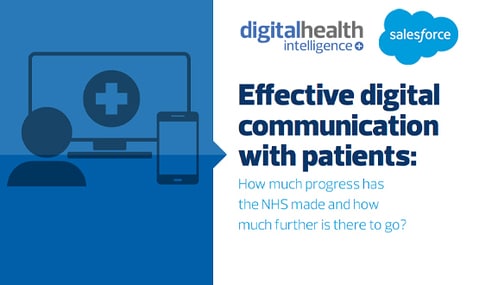Exclusive: DHI research reveals the barriers to digital communications with patients
- 27 July 2023

Effective digital communication with patients could make the NHS more efficient and deliver huge benefits for patients, so how much progress has been made? A major new report by Digital Health Intelligence in association with Salesforce, reveals the extent of the obstacles and points a way ahead, writes Lizzie Cernik
Digital exclusion, overwhelming and clashing priorities are among the top barriers preventing NHS services in the UK from utilising digital communication systems for patients to full capacity, according to a new Digital Health Intelligence report, published in association with Salesforce.
The report, which will be released at the 2023 Digital Health Summer Schools on 27 July, has been informed by a survey completed by 110 NHS staff across different areas of healthcare services, many of them in digital leadership roles, and in-depth interviews with 10 digital leaders, including chief clinical information officers (CCIOs), chief information officers (CIOs) and digital health experts in the private sphere.
The key findings focus on the challenges of implementing good communication systems for patients and the difficulties in widespread adoption, as well as the potential solutions available to NHS organisations and the benefits that could be realised.
Power to increase efficiency
According to one of our featured experts, Jane Tyacke, director of strategy and business development for healthcare at Salesforce, good digital communication systems not only have the power to increase NHS efficiency, through improved cancellation services and easier contact options, but they could also revolutionise the future of care. “We can enhance not only the patient experience but also manage the balance of supply and demand across all of the different care settings and providers in an ICS geography,” she said. In addition, digital systems can provide data that could be used to improve many aspects of the care system, from targeting vital vaccine information to tackling missed appointments.
While survey respondents agreed that successful implementation of digital communication systems would bring many benefits, they also highlighted barriers that need to be overcome first. Only 38% of respondents said it was easy or very easy to use the systems they had in place in their NHS organisation, while 62.5% reported that less than 30% of their patients are currently engaged with their digital communication services.
Digital exclusion
One key challenge that’s hindering the widespread implementation of digital patient communication systems is digital exclusion, which 11.1% of respondents cited as their biggest overall barrier. This included issues such as safeguarding for vulnerable people, lack of access to devices or good wi-fi connections, disability, cultural and language barriers and low digital literacy. For example, 42.4% of respondents to our survey said their healthcare organisations currently offer a range of options for patient communications, all of which require different logins, which can be overwhelming for both staff and patients.
Reluctance to change
Another key barrier identified by survey respondents and interviewees was the organisational culture of different services, including the reluctance to initiate major changes due to time pressures and constraints. Interviewees also stressed that wide ranging and conflicting priorities meant that there was limited time and resource to focus on the training, development and research needed to maximise the benefits of digital patient communication systems.
Dr Shane McKee, consultant in genetic medicine, Belfast Health and Social Care Trust and principal investigator, Northern Ireland Genomic Medicine Centre, who contributed to the report, said that change is essential to improve digital communication systems with patients. But he added: “Part of the role of the NHS and government is to help people to understand exactly what that will look like, and how their information will be safeguarded so that we can encourage use of these systems.”
Effective digital communication with patients: How much progress has the NHS made and how much further is there to go? Read the full report here.




